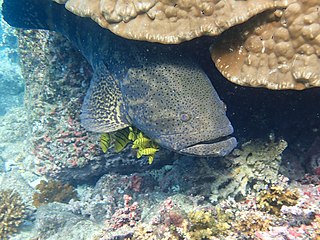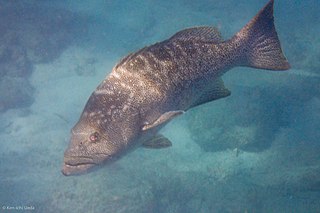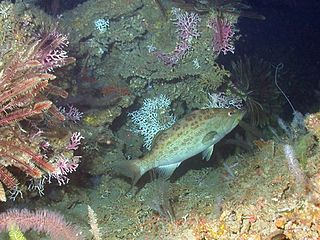
Mycteroperca bonaci, the black grouper, black rockfish or marbled rockfish, is a species of marine ray-finned fish, a grouper from the subfamily Epinephelinae which is part of the family Serranidae, which also includes the anthias and sea basses. Other fish are sometimes called the black grouper including the similar gag grouper, the misty grouper, and the critically endangered Warsaw grouper. This species is found in the western Atlantic Ocean from the northeastern United States to Brazil.

Mycteroperca microlepis, the gag, gag grouper, velvet rockfish or charcoal belly, is a species of marine ray-finned fish, a grouper from the subfamily Epinephelinae which is part of the family Serranidae, which also includes the anthias and sea basses. It comes from warmer parts of the West Atlantic, including the Caribbean and Gulf of Mexico. It is a drab, mottled-gray fish lacking the distinguishing features of most other groupers. Its pattern of markings resemble the box-shaped spots of the black grouper. It lacks the streamer-points on the tail fin that scamp and yellowmouth grouper have, and lacks yellow coloration around the mouth.

The yellowfin grouper is a species of marine ray-finned fish, a grouper from the subfamily Epinephelinae which is part of the family Serranidae, which also includes the anthias and sea basses. It is found in the warmer waters of the western Atlantic Ocean.

The marbled grouper, donkey fish, mutton hamlet, rockhind and sicklefish grouper, is a species of marine ray-finned fish, a grouper from the subfamily Epinephelinae which is part of the family Serranidae, which also includes the anthias and sea basses. It is a predatory reef fish which is found in the Western Atlantic Ocean.

The smooth grouper is a species of marine ray-finned fish, a grouper from the subfamily Epinephelinae which is part of the family Serranidae, which also includes the anthias and sea basses. It is associated with reefs and is found in the western Indian Ocean.
The Venezuelan grouper is a species of marine ray-finned fish, a grouper from the subfamily Epinephelinae which is part of the family Serranidae, which also includes the anthias and sea basses. It is found in northern South America and the Greater Antilles.

Mycteroperca is a genus of marine ray-finned fish, groupers from the subfamily Epinephelinae, part of the family Serranidae, which also includes the anthias and sea basses. They are predatory fish, largely associated with reefs and are found in tropical and subtropical seas in the Atlantic Ocean and the eastern Pacific Ocean. They are important target species for fisheries.

The Gulf grouper is a species of marine ray-finned fish, a grouper from the subfamily Epinephelinae which is part of the family Serranidae, which also includes the anthias and sea basses. It is endemic to Mexico.

The tiger grouper is a species of marine ray-finned fish, a grouper from the subfamily Epinephelinae which is part of the family Serranidae, which also includes the anthias and sea basses. It is found in the warmer waters of the western Atlantic Ocean.

The Pacific goliath grouper, also known as the Pacific itajara grouper, is a species of marine ray-finned fish, a grouper from the subfamily Epinephelinae which is part of the family Serranidae, which also includes the anthias and sea basses. It found in the eastern Pacific Ocean where it is associated with reefs. It is related to the Atlantic goliath grouper.

Cephalopholis panamensis, the Pacific graysby or Panama graysby, is a species of marine ray-finned fish, a grouper from the subfamily Epinephelinae which is in the family Serranidae which also includes the anthias and sea basses. It is found in the Eastern Pacific Ocean.

Epinephelus flavocaeruleus, commonly called blue-and-yellow grouper, is a species of marine ray-finned fish, a grouper from the subfamily Epinephelinae which is part of the family Serranidae, which also includes the anthias and sea basses. It is associated with reefs in the Indian Ocean.

Epinephelus summana, the summan grouper, is a species of marine ray-finned fish, a grouper from the subfamily Epinephelinae which is part of the family Serranidae, which also includes the anthias and sea basses. It comes from the Eastern Indian Ocean that occasionally makes its way into the aquarium trade.

Mycteroperca rosacea, the leopard grouper or golden grouper, is a species of marine ray-finned fish, a grouper from the subfamily Epinephelinae which is part of the family Serranidae, which also includes the anthias and sea basses. It is found in the Eastern Central Pacific that occasionally makes its way into the aquarium trade.

The scamp grouper, also known as scamp, is a species of marine ray-finned fish, a grouper from the subfamily Epinephelinae which is part of the family Serranidae, which also includes the anthias and sea basses. It is found in the western Atlantic Ocean.
The yellowmouth grouper, also known as the crossband rockfish, grey mannock, hamlet, harlequin rockfish, princess rockfish, rockfish, salmon grouper, salmon rock fish or scamp, is a species of marine ray-finned fish, a grouper from the subfamily Epinephelinae which is part of the family Serranidae, which also includes the anthias and sea basses. It is found in the Caribbean and in the tropical waters of the Atlantic Ocean. It is also found in pockets in Brazil. It is a fairly large fish and it gets its name from the yellow around its mouth.

Epinephelus labriformis, commonly called starry grouper or flag cabrilla is a species of marine ray-finned fish, a grouper from the subfamily Epinephelinae which is part of the family Serranidae, which also includes the anthias and sea basses. It is found in the eastern Pacific Occean.

Epinephelus undulosus, the wavy-lined grouper, brown-lined reefcod, mid-water rockcod, mid-water grouper, is a species of marine ray-finned fish, a grouper from the subfamily Epinephelinae which is part of the family Serranidae, which also includes the anthias and sea basses. It has a wide Indo-Pacific distribution. They are produced through aquaculture and commercially fished.

Dermatolepis dermatolepis, the leather bass is a species of marine ray-finned fish, a grouper from the subfamily Epinephelinae which is part of the family Serranidae, which also includes the anthias and sea basses. It is a predatory reef fish which is found in the eastern Pacific Ocean.

The Spanish flag is a species of marine ray-finned fish, a grouper from the subfamily Epinephelinae which is part of the family Serranidae, which also includes the anthias and sea basses. It is found in the western Atlantic Ocean. It is the only species in the genus Gonioplectrus.



















